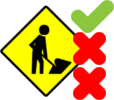The Stridsvagn 103 (Strv 103), also known as the Alternative S and S-tank, is a Swedish Cold War-era main battle tank, designed and manufactured in Sweden. 'Strv' is the Swedish military abbreviation of stridsvagn, Swedish for chariot and tank (literally combat wagon), while the 103 comes from being the third tank in Swedish service to be equipped with a 10.5cm gun. Developed in the 1950s, it was the first main battle tank to use a gas turbine engine and the only mass-produced tank since World War II to not use a turret besides the German Kanonenjagdpanzer. It has an unconventional design with a unique gun laying process: it is turretless with a fixed gun traversed by engaging the tracks (like the 75 mm gun on the 1930s French Char B1) and elevated by adjusting the hull suspension. The result was a very low-profile design with an emphasis on survivability and heightened crew protection level. Strv 103s formed a major portion of the Swedish armoured forces from the 1960s to the 1990s, when, along with the Centurions, it was replaced by the Leopard 2 variants Stridsvagn 121 and Stridsvagn 122. While most turretless armoured fighting vehicles are classified as assault guns or tank destroyers, the Strv 103 is considered a tank since its designated combat role matched those of other tanks within contemporary Swedish doctrine. (Source: Wikipedia.org, CC BY-SA)

